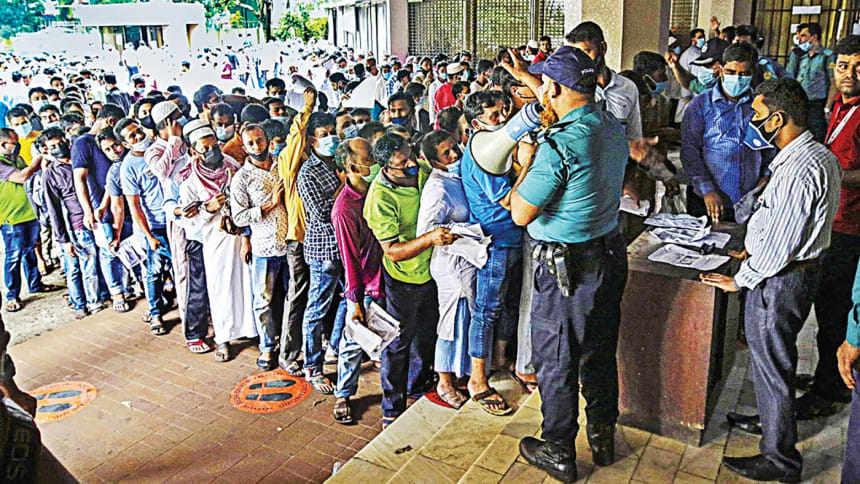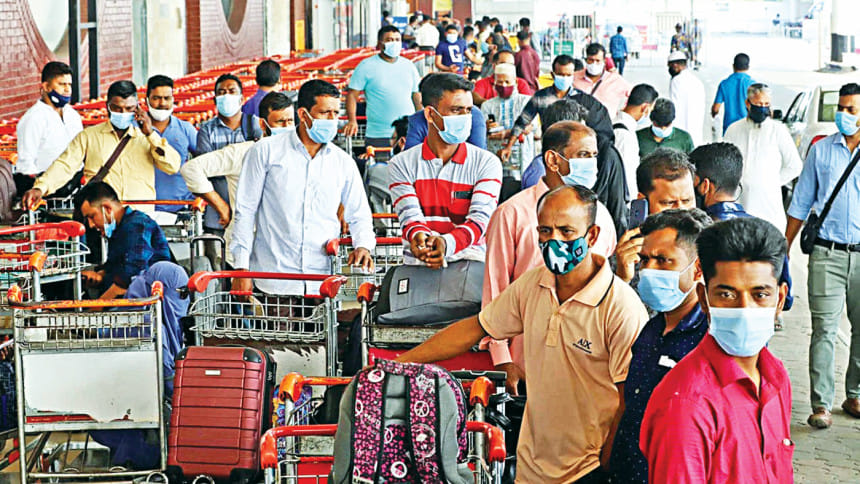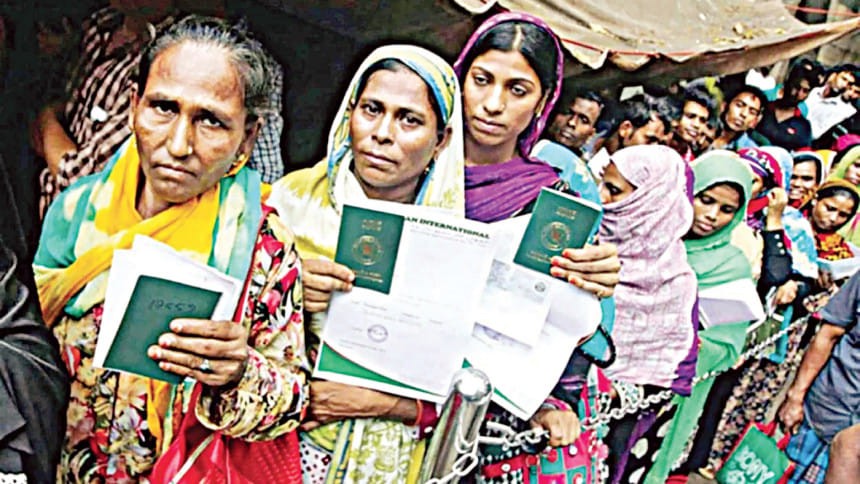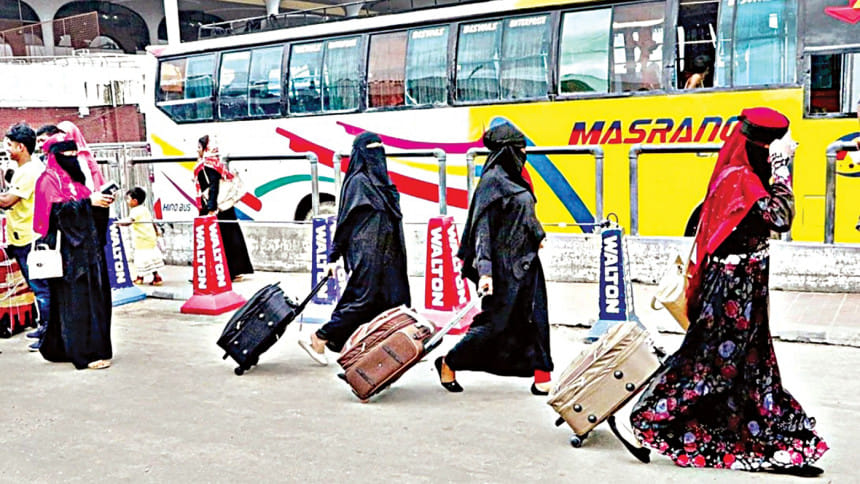Our migrant workers deserve better protection

How often have you heard the term "hundi" recently? I would bet quite a few times, especially if you've been following the worried discussions surrounding the cost-of-living crisis and economic downturn, both at home and abroad.
In Bangladesh, external economic shocks as well as our own misguided fiscal policies have led to high rates of inflation, and a foreign currency reserve so depleted that we had to resort to asking the IMF for a loan to shore ourselves up and avoid a Sri Lanka-style crisis in the future.
And in the debates surrounding our low forex reserves, fingers have been pointed at reduced export earnings, as well as remittances from migrant workers, whose tendency to opt for unofficial channels (otherwise known as hundi) to send money back home to their families has reportedly deprived the government of crucial dollar earnings.
Putting a pin on the fact that tax evasion, defaulted loans, and money laundering by the country's super-rich have probably done far more damage to our forex reserves and overall economic conditions than reduced remittances or exports ever could – and experts have identified the central bank's artificial overvaluation of the taka for at least a decade as a key reason behind the mushrooming of hundi – I'd like to ask one simple question. What have we done for our migrant workers, whose hard-earned income – often from back-breaking labour in horrific conditions – has propped up our economy for years and been an integral part of our development journey?
Should we expect them to give up using private agent-based informal channels – that give better exchange rates, charge minimal or no fees, work faster, and are more accessible, especially for women – and contribute to government coffers, simply out of patriotic zeal?
Even a cursory glance at the situation of migrant workers over the past few years will make clear that this might be a little too much to expect.
The 2022 FIFA World Cup, while it brought a great deal of joy to many, also brought to the fore the terrible conditions that migrant workers (especially from South Asia) endure in the Middle East. According to a report published by this daily to mark International Migrants Day (December 18) last year, out of the 45,301 Bangladeshi migrant workers who returned home in body bags and coffins between 2008 and June 2022, 63 percent died in the Gulf states.

A staggering 12,930 deaths took place in Saudi Arabia alone, while 5,123 died in the United Arab Emirates, 3,776 in Oman, 2,724 in Kuwait, 1,011 in Bahrain, and 1,562 in Qatar. The documents that arrive with these coffins routinely suggest that they had died from brain strokes or heart attacks, even though most workers tend to be young or middle-aged – only rarely are workplace accidents cited as the cause of death.
And these are only the deceased workers whose bodies were returned home. Reports suggest that there are many more migrant workers who died abroad but were buried locally, especially in Saudi Arabia.
The torture and abuse faced by female migrant workers in countries like Saudi Arabia is also common knowledge. In 2021, a Saudi court issued a landmark verdict against a Saudi family of three over the murder of Bangladeshi migrant worker Abiron Begum, but there are many more such Abirons who have been killed and received no justice. According to the International Organization for Migration (IOM), 70 percent of female migrant workers are abused and beaten by their employers, with their mobility restricted and wages withheld.
However, to this date, no national efforts have been made to investigate just how and why so many Bangladeshi migrant workers end up losing their lives abroad, or to hold to account the syndicates and middlemen that prey on economically and socially vulnerable women and send them abroad (according to an Ovibashi Karmi Unnayan Program report from last year, 88 percent of the 262 female migrant workers they surveyed were not provided with a written job contract).

It appears that, in the business of remittances, as long as the money comes home, the relevant authorities are least concerned about the circumstances in which the money is actually earned.
The same apathy seems to apply to the widespread wage theft of migrant workers that occurred during Covid-19 and continues to occur today, whether it is in the form of employers refusing to pay arrears and injury compensation, or middlemen and mega-employment companies who work as labour contractors and eat up huge segments of wages for their "services." Despite the fact that such instances of wage theft harm our national economy as well, no official initiative has been taken so far to support workers in claiming their dues.
What is even more concerning is that, according to research from the Refugee and Migratory Movements Research Unit (RMMRU), skilled labour migration from Bangladesh came down to 17.76 percent in 2022 from 21.33 percent in 2021. This has raised worries that unskilled workers, often recruited through informal channels, will become even more vulnerable to violence, exploitation and wage theft in the near future.
Against this bleak backdrop, it is necessary for the government and relevant agencies to engage with host countries and implement solutions to protect migrant workers abroad.
The immediate and most necessary step is the breaking up of recruitment rings that prey on vulnerable workers and, with the promise of work, trap them in exploitation and slavery abroad. While certain such groups have been busted over the years, there have been no serious investigations
into the real beneficiaries of this business, even though it is clear that corrupt government officials are also involved in giving approval to the migration process.

Experts have also argued that regularising the middlemen or sub-agents who recruit migrant workers and elevating them from their role as "brokers" is the ultimate solution to this problem. This can be done by registering them at the Bureau of Manpower Employment and Training (BMET), or at district employment and manpower offices.
The capacity of embassies and their staff to provide crucial services to migrant workers must be strengthened as well, and ease of access must be ensured. In Digital Bangladesh, is it too much to expect migrant workers to have access to an online portal that will support them through their immigration journey, and act as their first port of call for help when required?
Finally, the government must also acknowledge the fact that migrant workers face abuse and exploitation (and in worst cases, death) abroad, and that they and their families require support when they return home. Investigations must be opened into every single migrant death and abuse, and the authorities must put pressure on the host country to provide details of the circumstances. Psychosocial support for workers who have faced violence is a crucial factor here, especially female workers who have been sexually abused.
Support must also be given to returning migrant workers to ensure they have work at home, or are able to go abroad again. Training and upskilling of workers is a crucial factor here, since the more skilled they are, the less likely they are to be exploited in irregular, low-skilled jobs. While the government initiative of a loan fund worth Tk 1,290 crore last year to help returning migrant workers (among others) is appreciated, accessibility of such funds remains an obstacle for many.
However, it is also true that destination countries can often hold unfair leverage – if a labour-exporting country demands better protections for their workers, they can simply threaten to take their business elsewhere. The lack of recognition of migrant workforces' contributions in the host country's economic development, and the absence of a rights-based regime for workers, definitely increase their vulnerability. This is especially true in the Gulf States, where studies have shown a lack of labour laws that protect workers, and a general apathy towards implementing structural reforms.
Hence, it is high time for countries who have a high number of migrant workers to come together to collectively articulate their demands for workers' rights and protections in regional and global forums and processes. There is strength in numbers, and as the change in the kafala system of recruitment in Saudi Arabia demonstrates, it is possible to continuously campaign for change and see it happen, despite the huge resistance it initially faces.
Experts have said that pressure must be put on destination countries to commit to commissioning independent investigations into the death of each migrant worker, and to provide primary and emergency healthcare for low-paid migrant workers free of charge, regardless of their immigration status. Bangladeshi embassies can play a role in creating access to such healthcare as well.
All of these steps, however, have to be precluded by one important condition – the acknowledgement and understanding, from all concerned, that migrant workers are human beings who have rights, and who deserve decent work and living wages; they are not just economic units that contribute to our forex reserves and growth trajectory.

 For all latest news, follow The Daily Star's Google News channel.
For all latest news, follow The Daily Star's Google News channel. 



Comments